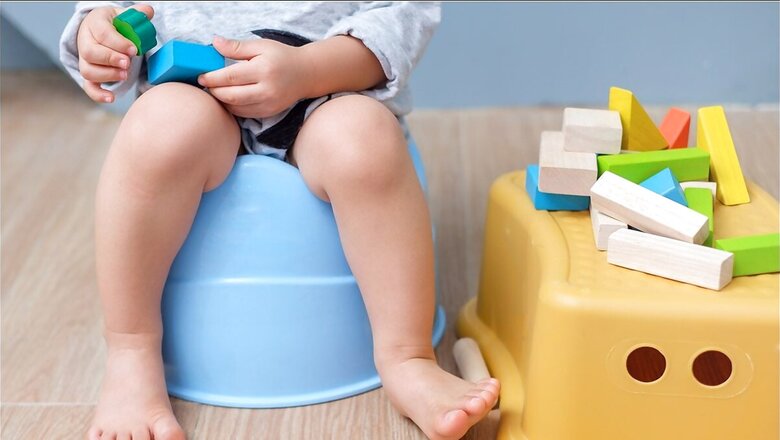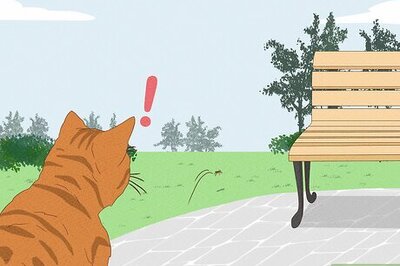
views
We live in a culture where several topics were considered taboo, till very recently. While there are social mores to consider here, some topics desperately needed to come out into the light, so we could talk about them openly. We can’t solve the problems we can’t talk about, after all. And someone needed to fix our toilet problem.
Then the Swachh Bharat Mission happened. Suddenly people were talking about toilets on TV and on social media, celebrities were going on cleaning drives, movies were teaching us about the plight of women in India’s villages without toilets, and our Prime Minister was washing sanitation workers’ feet, as a powerful message to the nation about the importance of the work they do.
We talked about toilets, we aired our grievances, we acknowledged our shortcomings, and then we set about fixing the problem. Between 2014-2019, the Swachh Bharat Mission constructed millions of toilets – so many, that we now have a toilet for every Indian.
But it didn’t stop there. The Sub-Group of Chief Ministers on Swachh Bharat Mission found that it wasn’t enough to construct physical toilets, but we also needed to change our attitudes towards using toilets. We needed to take ownership, we needed to see these toilets as a shared responsibility, and as a community, we needed to keep our toilets safe and clean.
As champions of this change, children have proved formidable. Children are not only more receptive to these ideas, but are also great role models for their families. When they learn about the links between toilet hygiene and disease, they tell their parents and elders. They insist on handwashing, and on construction of toilets at home, and on keeping these toilets clean.
Mitigating The Risks of Poor Toilet Habits
Poor toilet habits can have serious consequences for health, such as causing infections, diarrhoea, worms, and other diseases. They can also affect the environment, as human waste can contaminate water sources and soil.
By educating children about the benefits of using clean and safe toilets, we can help them develop good hygiene habits, prevent infections, and improve their quality of life. We can also inspire them to become hygiene heroes: agents of change who can advocate for better sanitation in their communities and beyond.
Good hygiene habits are essential for maintaining overall health and preventing diseases. They include washing hands, brushing teeth, bathing regularly, and keeping the body clean. Toilet sanitation is a fundamental aspect of personal hygiene, as it involves keeping the toilet area clean and disposing of human waste properly.
Hygiene heroes are not only aware of the importance of using toilets, but also of how to use them properly and safely. They know how to flush their waste, wash their hands with soap and water, and dispose of menstrual products or diapers hygienically. They also know how to keep the toilets clean and maintained, and how to report any problems or issues to the authorities.
How does teaching children about toilet sanitation empower them for life?
Teaching kids about toilet sanitation empowers them for life in many ways.
For one, it improves their own health and well-being. By using clean and safe toilets, and practising proper toilet hygiene, children can safeguard themselves against diseases and infections that can affect their growth, development, and learning. They can also avoid the stigma and discrimination that often comes with poor hygiene or open defecation.
Practising good hygiene boosts their confidence and self-esteem. There is a certain pride in being clean. They also gain respect and recognition from their peers, families, and communities for their positive actions and contributions.
Moreover, it fosters their sense of responsibility and citizenship. By taking care of toilets and promoting good hygiene practices, children can demonstrate their responsibility and care for themselves, others, and the environment. This paves the way to becoming active citizens who can participate in the decision-making processes that affect their lives.
Creating Awareness through Education
The role of parents, caregivers, and educators is vital in educating children about toilet sanitation. They can introduce the topic to young children in an age-appropriate way, using simple language and visual aids. Engaging children through stories, games, and interactive activities can make learning about toilet sanitation fun and enjoyable.
Where parents and caregivers are not equipped to talk about toilet hygiene, schools and communities share the collective responsibility of promoting hygiene education. In fact, the Sub-Group of Chief Ministers on Swachh Bharat Mission has put forth an education strategy that involves including a hygiene curriculum in schools, recognition and appointment of Swachhta Senanis in schools and colleges, specialised skill development and diploma courses for Environmental Sciences, Public Health Engineering and Municipal Engineering with focus on sanitation and waste management at a university level.
Fortunately, in India, this responsibility doesn’t rest with the government alone. Harpic, India’s leading brand in the lavatory care segment, has taken up the mantle of communicating the need and importance of toilet hygiene across age groups. Over the years, Harpic has created targeted, thought provoking campaigns that talk to various demographics.
Harpic has also partnered with News18 in the Mission Swachhta aur Paani Initiative, which has, for 3 years now, championed the cause of inclusive sanitation where everyone has access to clean toilets. It advocates equality for all genders, abilities, castes and classes and strongly believes that clean toilets are a shared responsibility.
Under the aegis of Mission Swachhta aur Paani, Harpic partnered with Sesame Workshop India, an educational non-profit working for the early developmental needs of young children, to promote positive sanitation, hygiene knowledge and behaviours among children and families through schools and communities, engaging with 17.5 million children across India. This, in addition to the messaging they already aimed at adults.
In addition to creating programming aimed at young children, Mission Swachhta aur Paani also pioneered a programme to raise awareness and reinforce healthy toilet and bathroom habits among young children, developing and recognising them as “Swachhta Champions”. As a part of the Swachhta ki Paathshaala initiative this year, well known actor and celebrity mom Shilpa Shetty visited the Primary School Naruar in Varanasi, to talk to children about good toilet habits, hygiene and its link to good health.
There are many ways you can contribute to this vital social change. Join us here, to learn how.


















Comments
0 comment